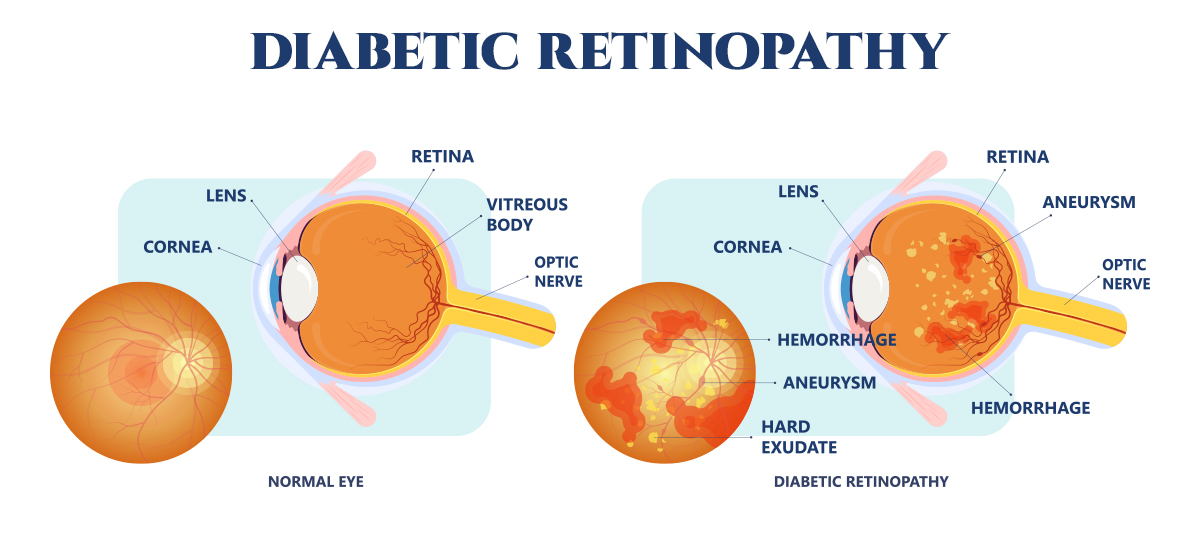
Retinopathy (Diabetic Eye Disease)
Diabetic retinopathy is a complication of diabetes that affects the eyes and the number one cause of preventable vision loss in the United States. It is caused by damage to the blood vessels in the retina, the light-sensitive tissue at the back of the eye.
Diabetes is caused by high blood sugar levels, which can damage the small blood vessels in the retina over time. This can lead to a range of eye problems.
Symptoms of diabetic retinopathy can include blurred or distorted vision, floaters, difficulty seeing at night, and a gradual loss of vision. If left untreated, diabetic retinopathy can lead to severe vision loss and even blindness. However, early detection and treatment can prevent or delay vision loss in most cases.
There are two primary stages of
diabetic eye disease
Non-Proliferative Diabetic Retinopathy (NPDR)
This is the early stage of diabetic retinopathy, where the damaged blood vessels in the retina leak fluid and blood, leading to swelling of the retina. Early diagnosis and treatment are essential for preserving your quality of sight.
Proliferative Diabetic Retinopathy (PDR)
In this stage, new abnormal blood vessels start growing in the retina. These new blood vessels are fragile and can bleed into the eye and retinal detachments, leading to vision loss.
Left untreated, PDR is capable of severely damaging central and peripheral vision – so it is a serious condition that requires immediate and careful medical care.
Diabetic Retinopathy Diagnosis
During the screening and diagnosis of diabetic retinopathy, your retina specialist will use special drops to widen your pupil, and then look through a lens for an inside view of your eye. For more precise results, optical coherence tomography (OCT) may also be used – scanning the retina with detailed images that can help detect macular swelling. Your medical history will also be reviewed with you for conditions and symptoms that may be related to the cause of your vision concerns.
Treatment for Diabetic Retinopathy
Treatment options for diabetic retinopathy may include retinal laser or intravitreal injections to regress retinopathy.
If you have diabetes, it is important to have regular eye exams to check for diabetic retinopathy as well as other eye conditions and vision problems. Maintaining healthy blood sugar levels, keeping blood pressure under control, and enjoying healthy lifestyle habits can also help prevent or delay the onset of diabetic retinopathy.
Diabetic Macular Edema
Diabetic macular edema (DME) is a complication of diabetic retinopathy, which is caused by damage to the blood vessels in the retina due to high blood sugar levels. In DME, fluid accumulates in the macula, the central part of the retina responsible for sharp, detailed vision. This swelling or edema can cause vision loss, blurriness, or distortion in the central visual field.
DME occurs when the damaged blood vessels in the retina leak fluid, proteins, and other substances into the macula, causing it to swell. The swollen macula can interfere with the normal functioning of the photoreceptor cells, which can lead to vision loss or distortion.
Diabetic Macular Edema Diagnosis
DME can be detected during a comprehensive eye exam that includes a dilated eye exam and imaging tests – such as optical coherence tomography (OCT) – which can visualize the macula and any swelling or fluid accumulation.
Treatment for Diabetic Macular Edema
Treatment for DME may include laser therapy, intravitreal injections of medications such as anti-VEGF (vascular endothelial growth factor) drugs or steroids – or a combination of these approaches.
Keeping blood sugar levels under control and managing your blood pressure can aid in reducing the risk of developing DME. Early detection and treatment is important as proper eyecare can prevent or delay further vision loss and improve overall visual function in people with diabetic retinopathy.
The team at South Carolina Retina Institute works diligently to help patients preserve or improve their eyesight. Our aim is to provide the best care possible for your situation and we stay informed on the latest medical breakthroughs that show promising results.
